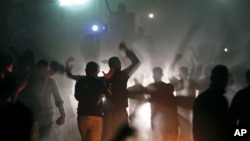Egypt held a second round of voting for parliamentary elections, but with two major opposition groups pulling out because of what they say has been widespread fraud. President Hosni Mubarak’s ruling National Democratic Party is expected to win in a landslide.
For many this Sunday, the pollution blanketing the capital served as a metaphor for the haze and depression that hovered over these elections.
The Muslim Brotherhood decided to boycott the second round of the vote because of what they say is fraud and abuse, and a crackdown that has left many of its members in jail. The group, which is banned as a political party, but can run candidates as independents, said to continue in the process would just endorse a farce.
The government explained the Brotherhood’s pullout as a reflection of the group’s poor official showing in the initial round - the popular movement failed to win a single seat. Government results show National Democratic Party candidates winning 209 seats in the first round. All other contestants combined won 12.
Samir Mahmoud Karam of the Egyptian electoral commission defended all criticism of the voting, saying the national monitoring system succeeded in its job during what he described as “this critical state in the history of our nation.”
Others, including American University in Cairo Professor Said Sadek have long criticized a monitoring process that rejects international observers. Sadek scoffs at the idea of the country’s nominal judicial oversight, recalling a statement attributed to Soviet leader Joseph Stalin.
"Even the idea of the judiciary is not enough, is not sufficient at all. What Stalin once said, 'It does matter who votes, what matters is who counts the votes,' so tallying the votes is also very important."
The run-off leaves 283 seats in contention, but a pattern emerges. The undecided seats all involve candidates from the NDP. Most pit one ruling party candidate against another, assuring a resounding victory for the party.
With the Muslim Brotherhood-backed candidates out, along with those from the Wafd Party, opposition figures still in the race number 16.
The Wafd decision was one that took at least some people by surprise. The nation’s oldest party, and one recently considered so loyal an opposition to the government as to be nearly part of it, its rejection of the process was an unexpected indictment.
Wafd spokesman Motaz Salah El-Din says such past criticisms were perhaps justified, but he says El-Sayed El-Badawi, who took control of the party earlier this year, has been trying to create a truly independent opposition.
El-Din says the new chairman has revived such stagnant committees as the youth wing, and political strategy groups, as well as attracted prominent intellectuals, all in the hope of leading the party, and the country, in a new direction.
Many human rights groups, would-be election monitors and independent media, have criticized the campaign from the beginning.
The resignation that has been long been felt about elections is now mingling with frustration.
Voter turnout Sunday was light, and of those who did go to the polls this election day and last week many were turned away for what they said seemed to them arbitrary or perhaps suspect reasons.
In some cases, the elections have led to rage. The latest violence has involved mainly security forces and opposition supporters, but the bitterness over this vote appears more widespread. The elections had been touted as a dry-run for next year’s presidential vote, and if so, there seem to be many here demoralized about the possibility of change.
Those close to President Hosni Mubarak insist he will run for another six year term. He has already been in power for 29 years.
But his age, 82, has brought with it a mixture of hope, as seen in the new leadership of the Wafd Party, and despair.
Said Sadek, of the American University in Cairo blames the Mubarak government as he tries to dispel an outsider’s impression of Egypt today - one of kindness, humor and community, where people go far out of their way to help friends and strangers alike.
“The worst thing is that they destroyed human development. The Egyptian people, they used to be generous, they used to have special characteristics - hospitality, generosity - all of this has been destroyed. People have become rude, aggressive, violent, cheating, cunning. You know, the mentality has changed, the political culture, the social system and values have changed and it got into a worse situation.”
Final elections results are expected in the coming days and, while the nature of the political culture may be in question, the reins of political power, at least for now, seem certain to stay the same.
Polls in Egyptian Runoff Close Under Protest














